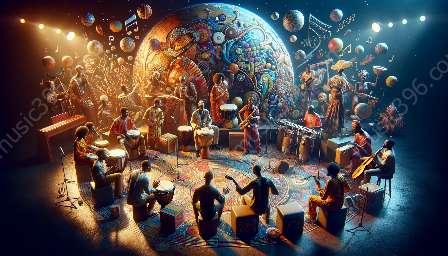Afrobeat is a genre of music with a rich history, complex musical composition, and captivating performance elements. It has made significant contributions to the world of music, blending various musical styles and cultural influences to create a unique and compelling sound.
History of Afrobeat
Afrobeat originated in the 1960s and 1970s in Nigeria, primarily attributed to the legendary musician Fela Kuti. He combined traditional Nigerian music with jazz, highlife, and funk, creating a new musical genre that was politically charged and socially conscious. Kuti's band, Africa '70, played a significant role in popularizing afrobeat, and the genre gained international recognition.
Musical Composition
Afrobeat's musical composition is characterized by its infectious rhythm, complex polyrhythms, and prominent horn sections. It typically features repetitive grooves and extended instrumental sections, offering musicians the opportunity for improvisation and musical exploration. The fusion of traditional African rhythms, jazz harmonies, and funk-inspired basslines creates a vibrant and dynamic musical tapestry.
Furthermore, afrobeat often incorporates call-and-response vocals, emphasizing communal participation and collective celebration. The lyrics often address social and political issues, reflecting the genre's roots in activism and resistance.
Performance Elements
Afrobeat performances are known for their high energy and audience engagement. The use of traditional African instruments such as the talking drum, shekere, and kalimba adds an authentic and culturally rich dimension to the live experience. The combination of dynamic percussion, infectious grooves, and lively horn arrangements creates an irresistible invitation to dance and revel in the music.
Moreover, afrobeat artists and performers often incorporate compelling choreography and theatrical elements into their live shows, enhancing the visual and sensory impact of the performance. The communal spirit and infectious rhythms create an immersive and inclusive atmosphere, encouraging audience members to become active participants in the musical celebration.
Afrobeat's Influence on Music
Afrobeat's impact extends beyond its musical composition and performance style. Its fusion of diverse musical traditions has influenced and inspired numerous contemporary music genres, including funk, jazz, and world music. The genre's social and political consciousness has also influenced the lyrical content and thematic approach of artists across various musical landscapes.
Additionally, afrobeat's rhythmic complexity and compelling grooves have found resonance in modern electronic and dance music genres, contributing to the evolution and diversification of global music trends. Artists and producers continue to draw inspiration from afrobeat's infectious rhythms and sonic textures, infusing them into their own creative endeavors.
Conclusion
Afrobeat's musical composition and performance elements contribute to its enduring appeal and cultural significance. The genre's fusion of traditional African music with global influences, coupled with its socially conscious themes and dynamic live performances, positions it as a vibrant and influential force in the world of music. As afrobeat continues to captivate audiences and inspire new generations of artists, its legacy remains firmly entrenched in the fabric of contemporary musical expression.












































